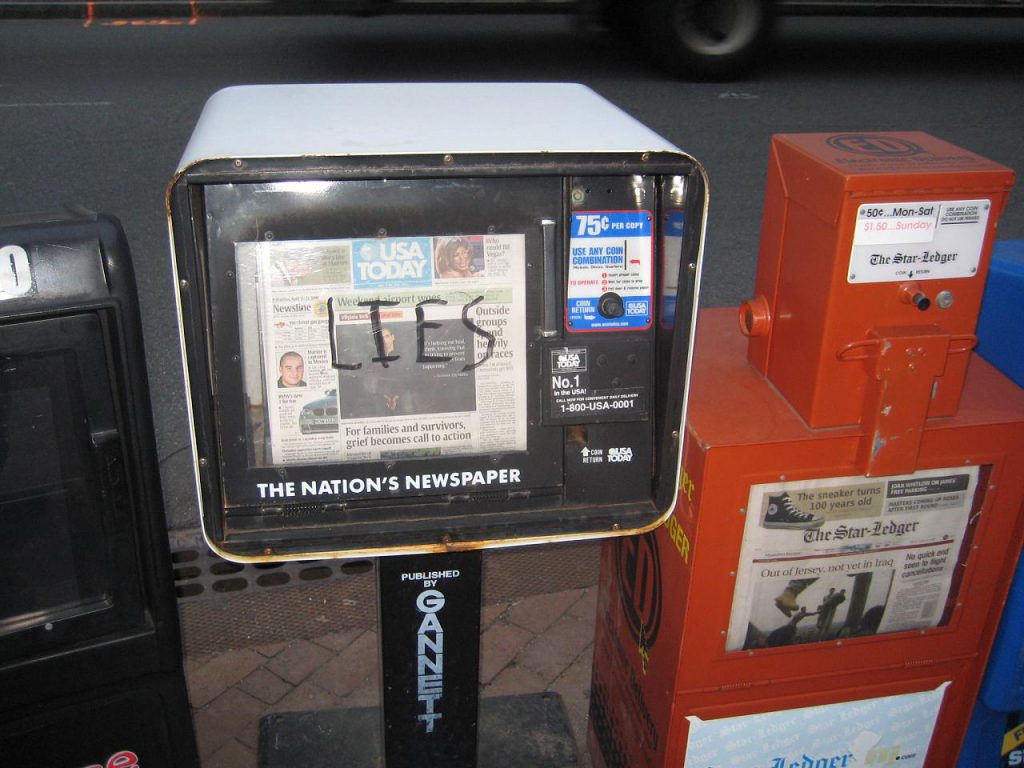
While we’re not in the business of creating safe spaces or slapping trigger warnings on our recommendations, it’s necessary to recognise that there’s no easy way to make this feature a Trump-free zone. It’s just the brave new world we all live in. Let’s dive right in…
The last few weeks have thrown up some notable examples of the different standards Trump and Clinton are held to, and the different levels of attention paid to the nominee’s claims, scandals and lies (perceived or actual). To this end, the issue of Foundations has been interesting, with the Clinton organisation coming under warranted scrutiny and outsized criticism long before Trump’s was meaningfully examined—though there’s been some movement of late.
So, for our post-fact world, here’s a whip through some useful reads and resources. Paul Krugman (here and here) and Charles Blow (here and here) have recently being holding Trump’s statements up to the light, and David Remnick has even launched the fact-checking series Trump and The Truth, over at The New Yorker. On the media’s role, the absolutely essential read is from E.J. Dionne, with background from The Economist and a pledge from the exec editor of the NY Times to call a lie a lie. Mr Samantha Power, renowned scholar Cass Sunstein, did a great video with Vox on the role of conspiracy theories in US politics today. See also a cracking journal article Sunstein co-wrote years back on conspiracy theories, as well as Roger Cohen on conspiratorialists in the Middle East. For your bookmarks folder, Slate are keeping watch on the ‘Four Horsemen of the Trump Apocalypse’, and Politifact are keeping tabs on DJT and HRC. If you’re having trouble tracking Trump’s insults and braggadocio, his Twitter Archive is laid bare for the world. And finally, naturally, Fleetwood Mac. 45 days to go…
There’s plenty of research on offer this week, kicking off with a brand new blog from The Williams Foundation called The Central Blue. With an Australian defence capability focus, it’s definitely worth keeping an eye on—and perhaps even submitting a post to. From the Peterson Institute of International Economics comes an excellent report (and a fun infographic) on the economic and trade agendas of the two presidential candidates. The Atlantic Council put out a new research paper on the US Army’s future as its demand increases and size diminishes. A joint effort from the Perth USAsia Centre and China Matters (PDF) argues that fanning the flames over PRC influence in Australia isn’t wise. And lastly, the Parliamentary Library has published its Briefing Book for the 45th Parliament (PDF), which covers off everything from national economy to climate change to counterterrorism.
The US House Armed Services seapower and projection forces subcommittee met this week met to discuss recent developments in the South China Sea. Witnesses included bigwigs Andrew Erickson, Bonnie Glaser and James Kraska—check out footage of their testimonies here. All three called for the US to ratify UNCLOS and take a tougher stance on China’s ‘illegal’ actions. If you don’t have 2.5 hours spare to watch the hearing, this piece from USNI News goes over the key recommendations. Looking to the future, an excellent read from War on the Rocks looks at how Chinese A2/AD capabilities and island-building efforts will affect US diplomacy and preventative action.
Podcast
If you’re keen to learn a little more about one of the most contentious areas of US–China relations, be sure to check out the latest episode (25 mins) of CSIS’s China Power podcast series on China’s behaviour in cyberspace. Bonnie Glaser sits down with Samm Sacks from the Eurasia Group to map out the long road ahead for both countries as they push to establish cyber norms.
Videos
60 Minutes dropped in on STRATCOM earlier this week to take a look at what they’ve dubbed ‘a new Cold War’ and how the US military is preparing for it. Check out the short series of interviews here (13 mins).
Our ICPC colleagues have just wrapped the first ASPI–CSIS cyber dialogue over in DC, the outcomes of which will no doubt be appearing on The Strategist over the coming weeks. When the closed-door dialogue concluded in the early hours of this morning it was onto the public event at CSIS HQ, where Prime Minister Malcolm Turnbull delivered a speech on ‘Deepening U.S.-Australia Cyber Security Cooperation’. The PM’s remarks were followed by a similar effort from US Homeland Security boss Jeh Johnson, and a Q&A facilitated by CSIS cyber tzar (and ICPC International Fellow) James Lewis. Take it all in here (1 hour).
Events
Canberra: Come along to ANU’s Crawford School on 10 October for a full day dialogue on the future of India and China’s strategic competition and cooperation in the Indo–Pacific. The all-star cast of panelists will offer perspectives from both states, and offer their thoughts on how tense ties between the two might upset the region’s balance of power.
Sydney: With the long-awaited first presidential debate to take place next Monday (Tuesday here in Australia), the USSC has thoughtfully planned ahead with a great free event on 28 September dissecting the candidates’ responses and what we’re likely to see in future debates leading up to 8 November. Register here. Also, for all the budding USyd diplomats out there, USSC is running a stellar competition that could see you acting as a US Foreign Service Officer at the US Embassy here in Canberra on election day. Get your thinking caps on and don’t miss out!

